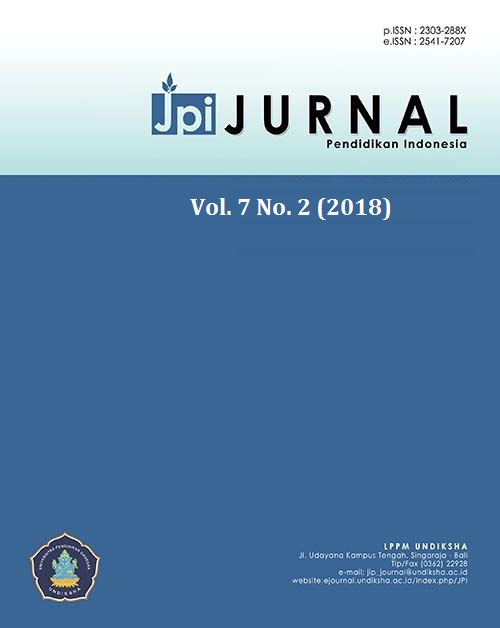The Online Learning of Teacher Profession Education Program (PPG) for In-service English Teachers: Challenges and Accelerated Learning Factors
DOI:
https://doi.org/10.23887/jpi-undiksha.v7i2.15650Kata Kunci:
Online Learning, In-Service English Teacher, Challenges, Accelerated Learning Factors, PPGAbstrak
The Indonesian government has currently implemented a hybrid learning program for in-service teachers who want to enroll in the Teacher Profession Education program (locally known as Pendidikan Profesi Guru). This Case study aimed to identify English teachers' perceptions on the challenges and accelerated-learning factors of online learning. 15 English teachers who were the participants of the said program hosted by Universitas Pendidikan Ganesha and 2 English mentors were the participants of the study. The informal interview was the main data collection technique which was transcribed verbatim and content analyzed. The participants of the study perceived 4 challenges of online learning, such as participants' lack of ICT skills, the incompleteness of the uploaded modules, instructors' unfamiliarity with the learning software, and the excessive assignments to be finished in limited time. There were 4 factors considered to accelerate teacher's learning: the mentor factor, the participant factor, the managerial factor, and the facility factor.Referensi
Cashion, J., & Palmieri, P. (2002). The secret is the teacher’: The learner’s view of online learning. NCVER, Adelaide.
Creswell, J. W. (2012). Educational research: Planning, Conducting and Evaluating Quantitave and Qualitative Research. Boston: Pearson Education, Inc.
Direktorat Jenderal Guru dan Tenaga Kependidikan. (2018). Pendidikan Profesi Guru (PPG) Dalam Jabatan Tahun 2018. Retrieved from https://drive.google.com/file/d/1KPD492LDt4thXU_xc8OUgPVTjx3W50jt/view
Elder, H. T. (1996). The cascade model of training : its place in the Pacific. Pacific Curriculum Network, 5(1), 13–15. Retrieved from http://directions.usp.ac.fj/collect/direct/index/assoc/D1064942.dir/doc.pdf
Erlingsson, C., & Brysiewicz, P. (2017). A hands-on guide to doing content analysis. African Journal of Emergency Medicine, 7(3), 93–99. https://doi.org/10.1016/j.afjem.2017.08.001
Hood, N. (2017). Conceptualising online knowledge sharing: what teachers’ perceptions can tell us. Technology, Pedagogy and Education, 1–13. https://doi.org/10.1080/1475939X.2017.1348980
Hur, J. ., & Brush, T. A. (2009). Teacher Participation in Online Communities : Why Do Teachers Want to Participate in Self-generate ... Journal of Research on Technology in Education, 41(3), 279–303. https://doi.org/10.1080/15391523.2009.10782532
Jacobs, R. L. (2002). Institutionalizing organizational change through cascade training. Journal of European Industrial Training, 26(2/3/4), 177–182.
Neuhauser, C. (2002). Learning Style and Effectiveness of Online and Face - to - Face Instruction,. The American Journal of Dis Tance Education, 16(2).
Omar, N. D., Hassan, H., & Atan, H. (2012). Student Engagement in Online Learning: Learners Attitude Toward E-Mentoring. Procedia - Social and Behavioral Sciences, 67(November 2011), 464–475. https://doi.org/10.1016/j.sbspro.2012.11.351
Schachar, M., & Neumann, Y. (2003). Differences Between Traditional and Distance Ed ucation Academic Performances: A meta -analytic approach,. The International Review of Research in Open and Distance Learning, 2(2).
The Learning House, & Aslanian Market Research. (2016). 2016 Online College Students: Comprehensive Data on Demands and Preferences .
Trust, T. (2017). Using cultural historical activity theory to examine how teachers seek and share knowledge in a peer-to-peer professional development network. Australasian Journal of Educational Technology, 33(1), 98–113. https://doi.org/10.14742/ajet.2593
Trust, T., Krutka, D. G., & Carpenter, J. . (2016). Computers & Education “ Together we are better ” : Professional learning networks for teachers. Computers & Education, 102, 15–34. https://doi.org/10.1016/j.compedu.2016.06.007
U.S. Department of education. (2010). Evaluation of Evidence - Based Practices in Online Learning: A Meta - Analysis and Review of Online Learning Studies. Retrieved from https://www2.ed.gov/rschstat/eval/tech/evidence-based-practices/finalreport.pdf
Utami, I. G. A. L. P. (2017). Genuine Involvement In Continuous Professional Development: How To See It? In 2nd International Conference on Innovative Research Across Disciplines (ICIRAD 2017). Advances in Social Science, Education and Humanities Research, volume 134 (pp. 210–215). Paris, France.: Atlantis Press, scientific publishing. https://doi.org/http://dx.doi.org/10.2991/icirad-17.2017.40
Utami, I. G. A. L. P., & Prestridge, S. (2018). How English Teachers Learn in Indonesia : Tension between Policy-driven and Self-driven professional development. Teflin Journal, 29(2), 245–265.
Utami, I. L. P., Saukah, A., Cahyono, B. Y., & Rachmajanti, S. (2017). Levels of Involvement in the English Teachers’ CPD (Continuous Professional Development): The Degree of Professional Enthusiasm. The Journal of Asia TEFL, 14(2), 336–345.
Vonderwell, S., & Zachariah, S. (2005). Factors that Influence Participation In Online Learning. Journal of Research on Technology in Education, 5191, 213–230. https://doi.org/10.1080/15391523.2005.10782457
Zainuddin, A., Kamaluddin, N., & Hassan, Z. (2012). Exploring Malay Student’s Commitment in Online Learning - A Case of Business Management Students. Procedia - Social and Behavioral Sciences, 67(November 2011), 81–92. https://doi.org/10.1016/j.sbspro.2012.11.309
Unduhan
Diterbitkan
Terbitan
Bagian
Lisensi
Authors who publish with the Jurnal Pendidikan Indnesia agree to the following terms:
- Authors retain copyright and grant the journal the right of first publication with the work simultaneously licensed under a Creative Commons Attribution License (CC BY-SA 4.0) that allows others to share the work with an acknowledgment of the work's authorship and initial publication in this journal.
- Authors are able to enter into separate, additional contractual arrangements for the non-exclusive distribution of the journal's published version of the work (e.g., post it to an institutional repository or publish it in a book), with an acknowledgment of its initial publication in this journal.
- Authors are permitted and encouraged to post their work online (e.g., in institutional repositories or on their website) prior to and during the submission process, as it can lead to productive exchanges, as well as earlier and greater citation of published work. (See The Effect of Open Access)








